Diplococcic - Study guides, Class notes & Summaries
Looking for the best study guides, study notes and summaries about Diplococcic? On this page you'll find 66 study documents about Diplococcic.
Page 2 out of 66 results
Sort by
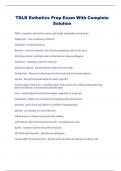
-
TDLR Esthetics Prep Exam With Complete Solution
- Exam (elaborations) • 6 pages • 2023
- Available in package deal
-
- $12.49
- + learn more
TDLR Esthetics Prep Exam With Complete Solution
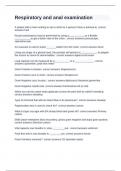
-
Respiratory and anal examination with correct answers 2024
- Exam (elaborations) • 2 pages • 2024
-
- $14.99
- + learn more
A patient told to have nothing to eat or drink for a period of time is advised to correct answers Fast Rectal examinations may be performed by using a____________or a flexible ____________to get a better view of the colon. correct answers proctoscope, sigmoidoscope An evacuant is used to expel _______matter from the colon correct answers fecal Using one finger of a gloved hand, the provider will perform a ____________ to palpate the rectum to check for abnormalities. correct answers...
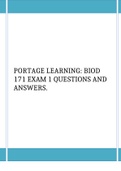
-
PORTAGE LEARNING: BIOD 171 EXAM 1 QUESTIONS AND ANSWERS
- Exam (elaborations) • 35 pages • 2023
-
- $16.99
- + learn more
PORTAGE LEARNING: BIOD 171 EXAM 1 QUESTIONS AND ANSWERS. PORTAGE LEARNING: BIOD 171 EXAM 1 QUESTIONS AND ANSWERS Exam 1. True or False: A virus is considered a microorganism. False. Viruses are not living and as such are not considered microorganisms. Viruses can, however, be classified as microbes, a more general term that includes microorganisms and viruses. 2. What is the smallest biological unit of life? A cell. 3. At a generalized level, all cells are comprised ...
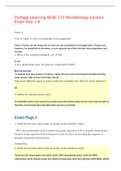
-
Portage Learning BIOD 171 Microbiology Lecture Exam Key 1-6
- Exam (elaborations) • 34 pages • 2022
-
- $16.99
- + learn more
Portage Learning BIOD 171 Microbiology Lecture Exam Key 1-6 Exam 1. True or False: A virus is considered a microorganism. False. Viruses are not living and as such are not considered microorganisms. Viruses can, however, be classified as microbes, a more general term that includes microorganisms and viruses. 2. What is the smallest biological unit of life? A cell. 3. At a generalized level, all cells are comprised of what? Macromolecules* *A student may also answer: Proteins,...
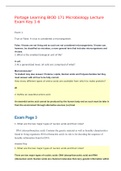
-
Portage Learning BIOD 171 Microbiology Lecture Exam Key 1-6( 2)
- Exam (elaborations) • 34 pages • 2022
- Available in package deal
-
- $15.49
- + learn more
Portage Learning BIOD 171 Microbiology Lecture Exam Key 1-6 Exam 1. True or False: A virus is considered a microorganism. False. Viruses are not living and as such are not considered microorganisms. Viruses can, however, be classified as microbes, a more general term that includes microorganisms and viruses. 2. What is the smallest biological unit of life? A cell. 3. At a generalized level, all cells are comprised of what? Macromolecules* *A student may also answer: Proteins,...
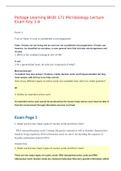
-
Portage Learning BIOD 171 Microbiology Lecture Exam Key 1-6
- Exam (elaborations) • 34 pages • 2022
- Available in package deal
-
- $15.59
- + learn more
Portage Learning BIOD 171 Microbiology Lecture Exam Key 1-6 Exam 1. True or False: A virus is considered a microorganism. False. Viruses are not living and as such are not considered microorganisms. Viruses can, however, be classified as microbes, a more general term that includes microorganisms and viruses. 2. What is the smallest biological unit of life? A cell. 3. At a generalized level, all cells are comprised of what? Macromolecules* *A student may also answer: Proteins,...
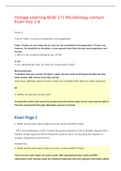
-
Portage Learning BIOD 171 Microbiology Lecture Exam Key 1-6
- Exam (elaborations) • 34 pages • 2022
-
- $16.99
- + learn more
Portage Learning BIOD 171 Microbiology Lecture Exam Key 1-6 Exam 1. True or False: A virus is considered a microorganism. False. Viruses are not living and as such are not considered microorganisms. Viruses can, however, be classified as microbes, a more general term that includes microorganisms and viruses. 2. What is the smallest biological unit of life? A cell. 3. At a generalized level, all cells are comprised of what? Macromolecules* *A student may also answer: Proteins,...
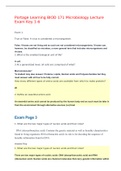
-
Portage Learning BIOD 171 Microbiology Lecture Exam Key 1-6( 2)
- Exam (elaborations) • 34 pages • 2022
- Available in package deal
-
- $15.49
- + learn more
Portage Learning BIOD 171 Microbiology Lecture Exam Key 1-6 Exam 1. True or False: A virus is considered a microorganism. False. Viruses are not living and as such are not considered microorganisms. Viruses can, however, be classified as microbes, a more general term that includes microorganisms and viruses. 2. What is the smallest biological unit of life? A cell. 3. At a generalized level, all cells are comprised of what? Macromolecules* *A student may also answer: Proteins,...
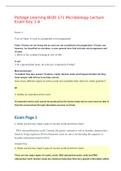
-
Portage Learning BIOD 171 Microbiology Lecture Exam Key 1-6
- Exam (elaborations) • 34 pages • 2022
- Available in package deal
-
- $15.49
- + learn more
Portage Learning BIOD 171 Microbiology Lecture Exam Key 1-6 Exam 1. True or False: A virus is considered a microorganism. False. Viruses are not living and as such are not considered microorganisms. Viruses can, however, be classified as microbes, a more general term that includes microorganisms and viruses. 2. What is the smallest biological unit of life? A cell. 3. At a generalized level, all cells are comprised of what? Macromolecules* *A student may also answer: Proteins,...
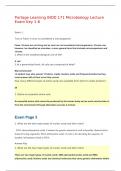
-
Portage Learning BIOD 171 Microbiology Lecture Exam Key 1-6
- Exam (elaborations) • 34 pages • 2023
-
- $15.49
- + learn more
Portage Learning BIOD 171 Microbiology Lecture Exam Key 1-6 Exam 1. True or False: A virus is considered a microorganism. False. Viruses are not living and as such are not considered microorganisms. Viruses can, however, be classified as microbes, a more general term that includes microorganisms and viruses. 2. What is the smallest biological unit of life? A cell. 3. At a generalized level, all cells are comprised of what? Macromolecules* *A student may also answer: Proteins,...

That summary you just bought made someone very happy. Also get paid weekly? Sell your study resources on Stuvia! Discover all about earning on Stuvia


